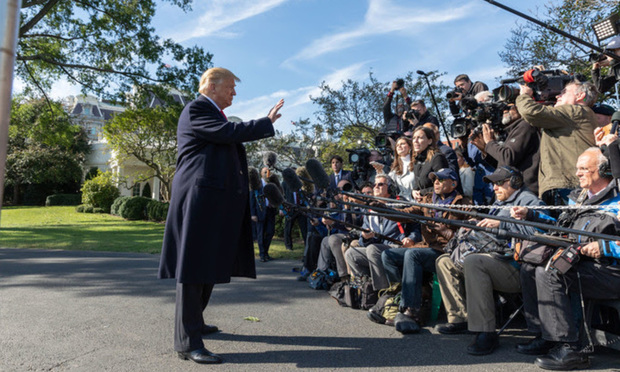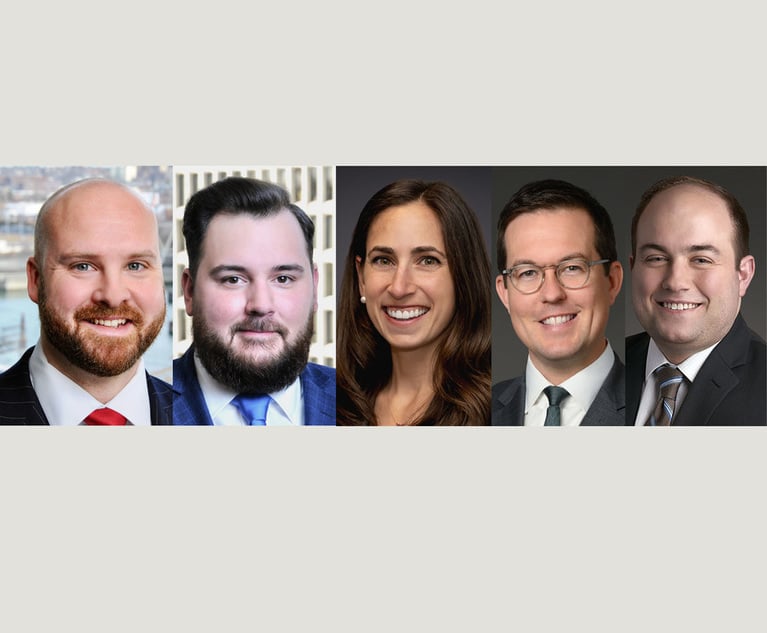Due Process Cited By Federal Judge in Restoring CNN Reporter's White House Pass
U.S. District Judge Timothy Kelly based his decision largely on a 1977 decision by the Washington federal appeals court, establishing that the White House must provide due process when revoking a reporter's press credentials.
November 16, 2018 at 10:29 AM
4 minute read
The original version of this story was published on National Law Journal
 President Donald J. Trump speaks with reporters along the driveway of the South Lawn of the White House Monday, Oct. 22, 2018, before boarding Marine One for his flight to Joint Base Andrews, Maryland, to begin his trip to Houston. (Official White House Photo by Joyce N. Boghosian)
President Donald J. Trump speaks with reporters along the driveway of the South Lawn of the White House Monday, Oct. 22, 2018, before boarding Marine One for his flight to Joint Base Andrews, Maryland, to begin his trip to Houston. (Official White House Photo by Joyce N. Boghosian)
The Trump administration must restore the press credentials of a CNN political reporter who has been denied access to the White House, a Washington federal trial judge ruled Friday, handing a blow to a president who has continually bashed some media organizations as “fake news” and called reporters “enemies of the people.”
U.S. District Judge Timothy Kelly, appointed by Trump last year to the federal trial bench, handed down the decision Friday after hearing arguments for two hours earlier this week. Kelly had initially planned to issue his decision at a Thursday afternoon hearing but postponed his announcement until Friday.
Kelly based his decision largely on a 1977 decision by the Washington federal appeals court, which established that the White House must provide due process when revoking a reporter's press credentials. “I simply have no choice but to apply that precedent,” he said.
Kelly said CNN and Acosta, represented by Gibson, Dunn & Crutcher, demonstrated a “likelihood of success” on its claim that the White House did not engage in an adequate process. He said whatever process that was provided to Acosta is “still so shrouded in mystery,” noting that the government could not definitely identify the official who made the initial decision to revoke Acosta's credentials.
At Wednesday's hearing, Kelly explored how he should consider “the unprecedented nature of what's happened here.” Justice Department attorney James Burnham said the president enjoys wide discretion to control press access to the White House.
“He clearly has the authority to do that,” Burnham said of the president's power to revoke a reporter's press credentials. Burnham said an order requiring the White House to restore Acosta's credentials would amount to an “intrusive form of relief,” adding that such a ruling would have the effect of countermanding the president's directive for “who can enter his space.”
“I am not aware of any precedent for that sort of judicial relief,” Burnham said.
Burnham also downplayed the importance of Acosta having access to the White House. He noted that CNN has about 50 other employees with press passes and that, by watching televised broadcasts of Trump's appearances, Acosta could “report on them just as well as he could if he was in the room.”
Gibson Dunn partner Theodore Boutrous, representing CNN, described Burnham's view of journalism as “warped.”
“That's not how reporters break stories,” Boutrous said, calling the media's access to the White House “highly valuable.”
Burnham had framed the White House's decision as driven not by Acosta's critical coverage of the administration but rather his behavior at a Nov. 7 press conference, during which he declined to give up a microphone or yield to other reporters waiting to ask questions. The White House initially said Acosta placed his hands on a White House intern who was trying to retrieve Acosta's microphone.
“Grandstanding and disrupting a press conference,” Burnham said, “is just not a viewpoint.”
Kelly, however, on Friday questioned the accuracy of that accounting of the interaction between the intern and Acosta.
[falcon-embed src="embed_1"]
Boutrous, joined in court by Gibson Dunn partner Theodore Olson, pointed to Trump's past criticism of Acosta and CNN as “fake news.” “On its face,” Boutrous argued, “the government's action was content-based.” He added: “The content-based evidence is really overwhelming.”
Numerous media organizations, represented by Ballard Spahr, are backing CNN in its fight to restore Acosta's press credentials.
Read more:
Judge Plans Swift Ruling in CNN Suit Against Trump Over Press Access
Gibson Dunn Backs CNN, Acosta in White House Press Pass Lawsuit
This content has been archived. It is available through our partners, LexisNexis® and Bloomberg Law.
To view this content, please continue to their sites.
Not a Lexis Subscriber?
Subscribe Now
Not a Bloomberg Law Subscriber?
Subscribe Now
NOT FOR REPRINT
© 2025 ALM Global, LLC, All Rights Reserved. Request academic re-use from www.copyright.com. All other uses, submit a request to [email protected]. For more information visit Asset & Logo Licensing.
You Might Like
View All

Apple Disputes 'Efforts to Manufacture' Imaging Sensor Claims Against iPhone 15 Technology

New Partners at Cummings & Lockwood, Carmody Torrance Sandak & Hennessey
2 minute read
Trending Stories
- 1'It's Not Going to Be Pretty': PayPal, Capital One Face Novel Class Actions Over 'Poaching' Commissions Owed Influencers
- 211th Circuit Rejects Trump's Emergency Request as DOJ Prepares to Release Special Counsel's Final Report
- 3Supreme Court Takes Up Challenge to ACA Task Force
- 4'Tragedy of Unspeakable Proportions:' Could Edison, DWP, Face Lawsuits Over LA Wildfires?
- 5Meta Pulls Plug on DEI Programs
Who Got The Work
Michael G. Bongiorno, Andrew Scott Dulberg and Elizabeth E. Driscoll from Wilmer Cutler Pickering Hale and Dorr have stepped in to represent Symbotic Inc., an A.I.-enabled technology platform that focuses on increasing supply chain efficiency, and other defendants in a pending shareholder derivative lawsuit. The case, filed Oct. 2 in Massachusetts District Court by the Brown Law Firm on behalf of Stephen Austen, accuses certain officers and directors of misleading investors in regard to Symbotic's potential for margin growth by failing to disclose that the company was not equipped to timely deploy its systems or manage expenses through project delays. The case, assigned to U.S. District Judge Nathaniel M. Gorton, is 1:24-cv-12522, Austen v. Cohen et al.
Who Got The Work
Edmund Polubinski and Marie Killmond of Davis Polk & Wardwell have entered appearances for data platform software development company MongoDB and other defendants in a pending shareholder derivative lawsuit. The action, filed Oct. 7 in New York Southern District Court by the Brown Law Firm, accuses the company's directors and/or officers of falsely expressing confidence in the company’s restructuring of its sales incentive plan and downplaying the severity of decreases in its upfront commitments. The case is 1:24-cv-07594, Roy v. Ittycheria et al.
Who Got The Work
Amy O. Bruchs and Kurt F. Ellison of Michael Best & Friedrich have entered appearances for Epic Systems Corp. in a pending employment discrimination lawsuit. The suit was filed Sept. 7 in Wisconsin Western District Court by Levine Eisberner LLC and Siri & Glimstad on behalf of a project manager who claims that he was wrongfully terminated after applying for a religious exemption to the defendant's COVID-19 vaccine mandate. The case, assigned to U.S. Magistrate Judge Anita Marie Boor, is 3:24-cv-00630, Secker, Nathan v. Epic Systems Corporation.
Who Got The Work
David X. Sullivan, Thomas J. Finn and Gregory A. Hall from McCarter & English have entered appearances for Sunrun Installation Services in a pending civil rights lawsuit. The complaint was filed Sept. 4 in Connecticut District Court by attorney Robert M. Berke on behalf of former employee George Edward Steins, who was arrested and charged with employing an unregistered home improvement salesperson. The complaint alleges that had Sunrun informed the Connecticut Department of Consumer Protection that the plaintiff's employment had ended in 2017 and that he no longer held Sunrun's home improvement contractor license, he would not have been hit with charges, which were dismissed in May 2024. The case, assigned to U.S. District Judge Jeffrey A. Meyer, is 3:24-cv-01423, Steins v. Sunrun, Inc. et al.
Who Got The Work
Greenberg Traurig shareholder Joshua L. Raskin has entered an appearance for boohoo.com UK Ltd. in a pending patent infringement lawsuit. The suit, filed Sept. 3 in Texas Eastern District Court by Rozier Hardt McDonough on behalf of Alto Dynamics, asserts five patents related to an online shopping platform. The case, assigned to U.S. District Judge Rodney Gilstrap, is 2:24-cv-00719, Alto Dynamics, LLC v. boohoo.com UK Limited.
Featured Firms
Law Offices of Gary Martin Hays & Associates, P.C.
(470) 294-1674
Law Offices of Mark E. Salomone
(857) 444-6468
Smith & Hassler
(713) 739-1250










